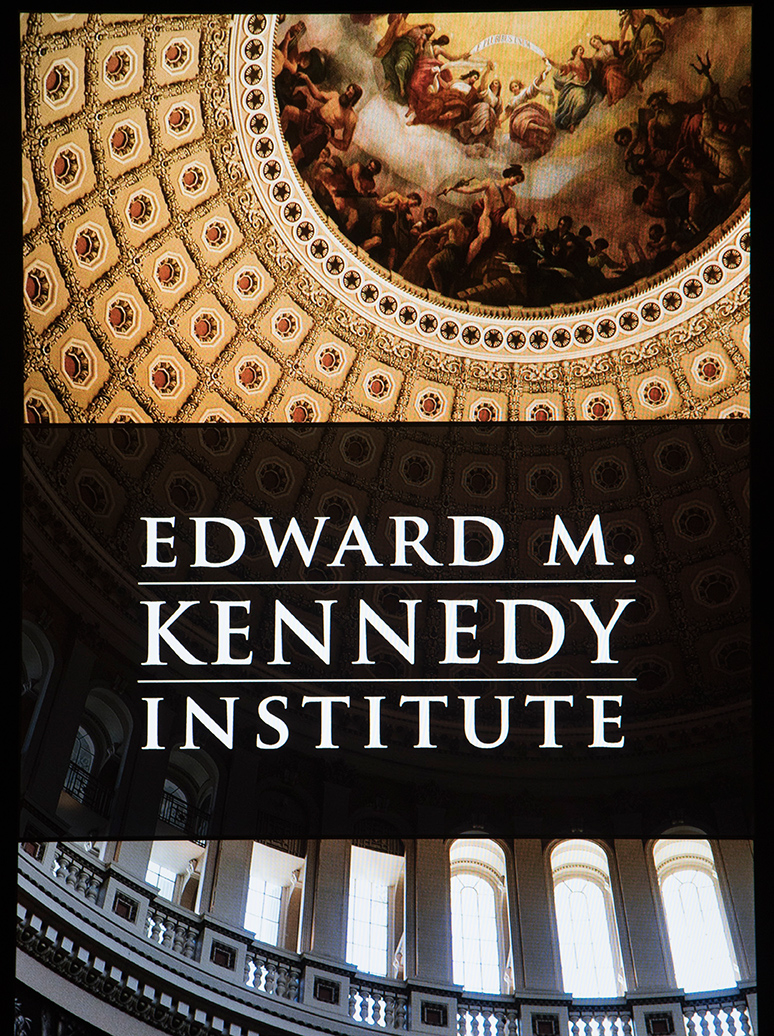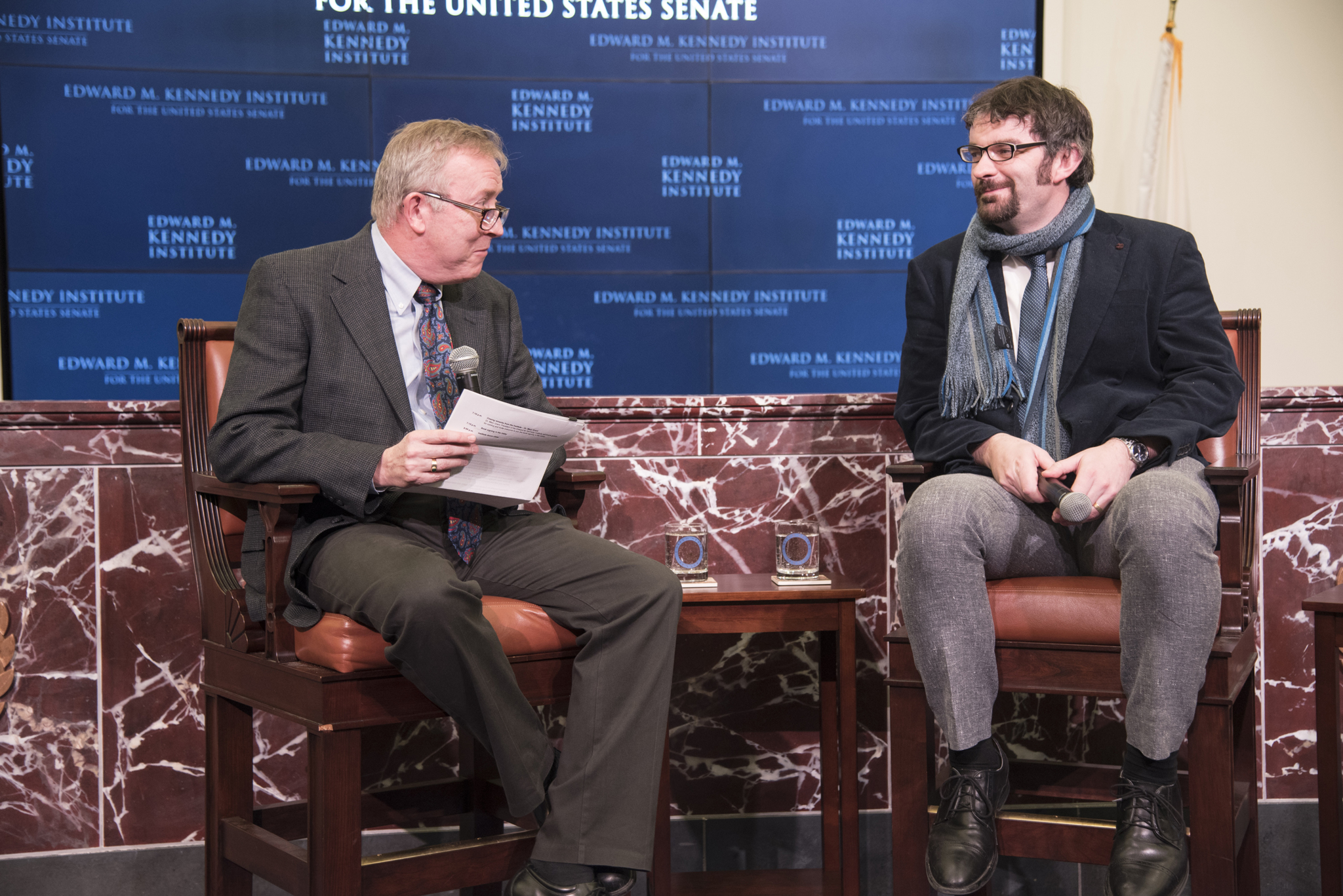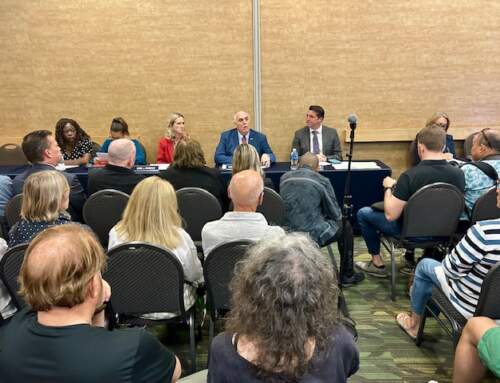
Edward M. Kennedy Institute
By Richard Campbell
Writer and filmmaker Maurice Fitzpatrick was introduced by several speakers this past Monday night at the EMK Institute with stories of their forefathers who filled in the mingling history between famous Boston Irish Americans and John Hume, the politician and peacemaker from Derry, Ireland, who is the subject of Fitzpatrick’s recently released book and movie. Matthew Kennedy, the son of Joe Kennedy II, shared comments about the significance of Boston politicians in association with John Hume. Aiden Hume, John Hume’s son, commented upon the relationship between Ted Kennedy and his father, and focused upon John Hume’s life long quest for peace in Northern Ireland, and recent struggles with dementia. UMass professor Tom O’Grady, who moderated the discussion, detailed Fitzpatrick’s journey in researching the book from the perspective of their personal relationship over the years, and then fleshed out the history of both projects by asking the author pointed questions.
For those not so familiar with this time period of Irish history, from the 1960’s until the 1990’s Northern Ireland was embroiled in a conflict known as “the troubles” in which Protestants and Catholics battled it out killing thousands of people. The significant reduction to the conflicts in 1998 was brought about with what is called the Good Friday Agreement. Life became easier in Northern Ireland, as the peace achieved brought a flood of capital in tourism and business to its shores. There are only a few who figure so large in the Irish peace process as John Hume; who not only seemed to set the frame of reference for reconciliation needed to bring peace, but had persistently stewarded the Northern Ireland peace process at critical moments for years when it looked like all was lost. As a founding member of the SDLP, Social Democratic and Labor Party, he became a beloved national hero, and not insignificantly: shared the Nobel prize with David Trimble, and was awarded the Gandhi Peace prize for his efforts. It is no wonder: for if ever there were a set of intractable opponents, the two major sides of the Irish troubles certainly fit the bill.
Aiden Hume and Matthew Kennedy mentioned the rather famous telephone call in 1972 when Ted Kennedy called his father at his home, and John Hume thought he was being put on by some friends. Ted Kennedy wanted to know the true story of what was happening on the ground in Northern Ireland, and was told Hume was the most reliable source. It was the beginning of a friendship and a concerted effort by Hume to bring about a peaceful resolution- to revoke the idea that the violence of the IRA was the way to go- and to bring the cause of a United Ireland to the forefront of international relations. As an independent Nationalist, Hume is given a great deal of credit for helping to mobilize many people across the pond, most notably the “four horsemen” Ted Kennedy, Tip O’Neill, Daniel Patrick Moynihan, and Hugh Carey- as well as presidents from Carter to Clinton to provide economic assistance and political clout. While some would underrate the necessity of this US strategy, history clearly shows Hume’s political skill in bringing power to bear upon the peace process was quite an accomplishment. More than a few speakers emphasized the role of long strategy meetings between O’Neill, Kennedy and Hume, that removed impasses and paved the road to a more peaceful Ireland. There was not the time to discuss the current problems in Northern Ireland that might threaten a sustained peace. The fact that politicians in both Ireland and America were once capable of sitting down with their opponents to hammer out deals for the common good of their nations (in contrast to today) was a theme amplified by comments and questions during the talk.
It is interesting to note in the season of South Boston’s St. Patrick’s Day parade that in Northern Ireland there are over 4,000 parades a year-representing both the Catholic and Protestant sides of the nation. If we think our parade draws controversy, we would be well to examine some of the issues that arise in Northern Ireland during their parades. Add to this fact that there are five major political parties in Northern Ireland: Sinn Féin, Ulster Unionist Party, the DUP, Social Democratic and Labour Party, and Alliance Party, and one can see how conflict resolution is complicated.
From hunger strikes to challenging unjust laws, arm twisting and cajoling, holding discussions with all sides of the conflict- sometimes in secret- Hume’s career was one of such tireless advocacy for peace that even many of his opponents pay tribute to him. Fitzpatrick’s book “John Hume in America from Derry to DC, is followed by the author with his film: “In the Name of Peace” on the same subject. The film will play at Somerville Theater Irish Film Festival on March 25th. In the film, Fitzpatrick documents the long road to peace, and got former presidents to go on record revealing a timeline of negotiations. When questioned by Tom O’Grady about the difficulty of getting access to presidents to interview them about their relationship with John Hume, Fitzpatrick suggested that it wasn’t easy, but that the mere mention of Hume’s name opened doors. In some sense you get the feeling that Fitzpatrick wishes to make sure history doesn’t forget John Hume, as other figures in the conflict have drawn more media attention, especially since Hume’s retirement and illness.
Fitzpatrick appeared to be a very down to earth person, having studied at Trinity College, Dublin, has taught in Germany and Japan, and is intrinsically talented in multiple fields. He also seems to know the importance of documentary film in preserving history. When asked about how he decided to become so invested in John Hume’s story, he said it was because it was so interesting, but also that it was “virgin soil”-that no one had really told the story of Hume’s relationship to his American counterparts. He didn’t fail to mention pillars of Irish literature, John Millington Synge, Seamus Heaney, and Brian Friel, and their impact on his work and contemporary culture. This kind of documentary work in either book or film form, I suspect is a bit risky in America these days, as no doubt we live in a culture that is essentially ahistorical, and rarely attends to our own history, let alone Ireland’s. The word across the pond is that both the film and the book have been well received, and the Institute’s timely occasion underscored the relations we Americans still have with Ireland. The EMK Institute is planning an event on the Good Friday Agreement on Thursday, April 5, 2018, 5:30 PM, which will feature a keynote address by Senator George Mitchell. Éirinn go Brách!






